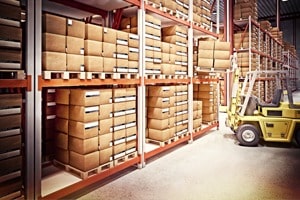Simply explained: storage arrangement with practical examples from intralogistics
The efficient operation of a warehouse is characterized by operational tasks that are diverse in nature. This includes, for example, the allocation and definition of storage areas, the division of such areas, the monitoring of stock levels and a continuous analysis of optimization potential. Storage arrangement plays a role here, as it forms the basis for the organization of storage space allocation.
Definition of storage arrangement: a system that makes warehouse items clearly assignable
A look in the cellar or attic at home shows that there is obviously a "system", even if it's chaotic. One sorts meticulously and categorizes, the other proceeds more roughly and subdivides into a few distinguishing features. And yet, at least from the point of view of the originator, there is a certain storage order. The only difference is that this rarely seems just as clear and transparent to outsiders.
Having said that, this already describes the core of the storage arrangement. This is a system that can be used to clearly allocate warehouse items and warehouse order. The function of the storage arrangement is to establish rules on how goods are stored and transported.
Important: Depending on the storage system chosen, IT-supported storage bin management is required to ensure that you don't lose track. You can find out which types of storage arrangements this applies to and what the differences are in the next paragraph.
Overview of storage arrangement types and their advantages
Depending on the size, type of goods and scope of the product range, different storage systems are selected or preferred depending on the industry. We present the most important types and their differences below:
Fixed storage arrangement
With this method, an article or a specific stored item is always assigned the same storage bin. Order pickers know immediately where the goods they are looking for are located and can optimize their processes. Aspects such as the value of the goods, the length of the route or the weight, product dimensions as well as volume and removal frequency form criteria for storage location management. The advantage of these storage arrangement lies in the simplicity of the organization of the storage, it is clear and comprehensible.
A disadvantage of the fixed storage arrangement, however, is the fixed capacity limit, and reallocations are associated with high costs. The omission of an article, for example due to non-existent supplier relationships, also creates empty spaces.
Variable (free or chaotic) storage arrangement
This form of storage arrangement is based on the fact that each item is always placed wherever space is currently available. This can be done randomly ("chaotic warehouse") or guided by criteria. Typically, the frequency of access is one of the important aspects, but allocation in the context of the cross-distribution strategy is also common. This requires intelligent, computerized storage location management.
One of the main advantages of the free storage system is that existing storage capacity can be optimally utilized using algorithms. At the same time, the underlying warehouse regulations and warehouse organization are very complex, and warehouse employees must be continuously trained and incoming and outgoing goods must be permanently documented.
Fixed-variable storage arrangement
A third variant combines both types of storage arrangement, combining the advantages of both systems. This is implemented, for example, through a clearly defined product range that is brought into a specific storage zone. However, the system within this zone is chaotic, with free choice of space and what the chaotic storage arrangement is able to achieve on a small scale.
